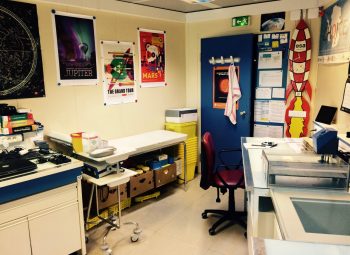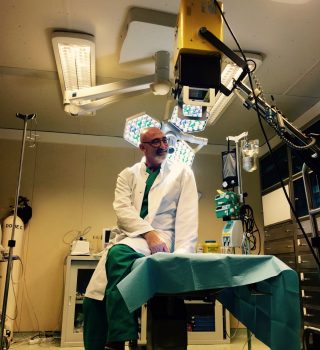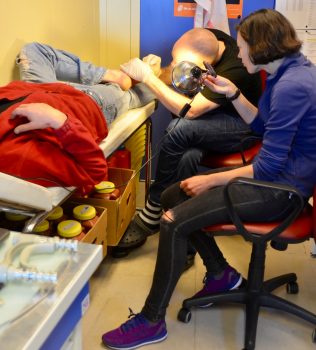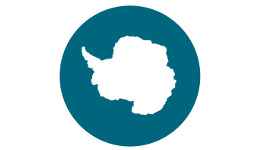Dr. Carole Dangoisse is this year’s ESA-sponsored medical doctor spending 12 months at Concordia research station in Antarctica. She is facilitating a number of experiments on the effects of isolation, light deprivation, and extreme temperatures on the human body and mind. In the following post, she summarises some of the experiments as well as the training she received to prepare her for a year on the frozen continent.

Credit: ESA/IPEV/PNRA-C. Dangoisse
Even though my primary objective at Concordia is carrying out research, I cannot let go of the fact that I am a physician first and foremost. I therefore take every opportunity I can to visit the hospital and observe what my medical colleagues are confronted with and how they manage.
Although we are extremely distant from any large medical facilities, the Concordia hospital is far from my idea of “bush medicine”. The equipment is very exhaustive: it includes a surgical room with the possibility of performing general anesthesia, a dentist section, telemedicine devices, and everything needed to perform X-rays and simple blood or urine analysis.

Credit: ESA/IPEV/PNRA-C. Dangoisse
This is all of course mandatory because during the nine months of isolation, we cannot be evacuated, even for emergencies. We will therefore need to be entirely self-sufficient for any medical or surgical situation that might arise, just like if we were going to Mars!
Is there a doctor in the house?
The typical problems the doctors see during the summer campaign are handling injuries such as crush fractures and excoriations, frostbite, colds and quite a few dental issues. Since we are at the equivalent of 3800 metres, a few people also suffer from acute mountain sickness in the first few days after their arrival. The oxygen tanks are therefore available first-hand when a plane lands.
The doctors discuss any slightly serious injury with referring teams back home. The likelihood of an evacuation has to be brought up quickly, since even during the summer campaign planes are not always available.

Credit: ESA/IPEV/PNRA-C. Dangoisse
I am merely an observer for all things medical, but am responsible for retrieving any injured person in the station or on the grounds, and bringing them back safely to the hospital. I am the equivalent of Concordia’s “ambulance” team!
During the summer, I have to fulfill this duty for one minor trauma incident. The retrieval process confirms the importance of precise and calm communications, organisation, and removal of the injured from the cold environment as a priority.




Discussion: 2 comments
Hi Carole: found your blog. How are you?
Dear Concordia Team,
if I am right, Dr. Carmen Possnig should be part of your team?
If so, I am very curious about the RX goggles and how they perform in your surrounding. Would be great if you can send me a feedback (foto as well?). And please tell me, if I can poste it on our website or we can get linked together?
sunny greetings from Vienna,
Christoph